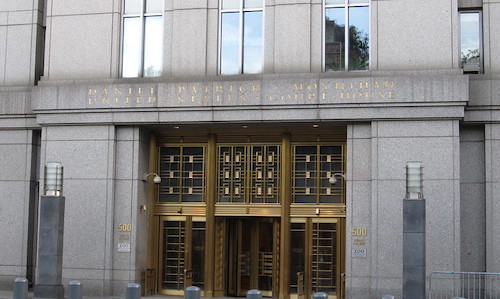“Allowing any case to be governed by Terms of Service agreed upon by an attorney solely for the purpose of carrying out due diligence pre-suit investigations to verify the existence of a legitimate, non-frivolous claim, would be a very dangerous precedent and would have serious policy implications.”

Daniel Patrick Moynihan U.S. Courthouse, home of the Southern District of New York. Photo by Ken Lund. CC BY-SA 2.0.
A fascinating arbitration issue was recently ruled on by the Southern District of New York. The question presented to Chief Judge Colleen McMahon was, essentially, whether the pre-filing investigations by an attorney for a patent owner worked to compel arbitration?
More specifically, Brian Haan of Lee Sheikh Megley & Haan LLC, an attorney for patent owner Jedi Technologies, accessed the defendant’s website in order to engage in pre-filing due diligence, as is both prudent and legally required pursuant to FRCP Rule 11 prior to the filing of any lawsuit. Believing that the defendant’s SCRUFF app incorporated technologies claimed in Jedi’s U.S. Patent No. 10,164,918, he signed up and viewed SCRUFF as a part of this investigation. The SCRUFF Terms of Service (TOS) included a boilerplate arbitration clause that purported to prevent users from filing claims in any court of competent jurisdiction, and instead compelling arbitration.
The question presented was whether the reasonable, prudent, ethical and necessary actions of counsel for the patent owner during mandatory pre-suit due diligence deprived the patent owner of an Article III forum to resolve the patent infringement dispute between the parties. Chief Judge McMahon, in deciding the defendant’s motion to compel arbitration, ruled that the arbitration clause did not deprive Jedi of access to the federal district court and refused to compel arbitration. See Perry Street Software, Inc. v. Jedi Technologies, Inc., Case 1:20-cv-04539-CM Document 66 (December 15, 2020).
“The fact that Mr. Haan signed up for SCRUFF is insufficient to conclude that his actions bound Jedi to Perry’s TOS,” Chief Judge McMahon wrote. “For there to be an agreement to arbitrate, there must be evidence that Jedi (not Haan) knowingly agreed to Perry’s TOS and the arbitration clause contained within it. Since Jedi never signed up for SCRUF, there must be evidence that Jedi authorized Haan to assent to the clause on its behalf.” Under New York law a party cannot be compelled to arbitrate unless the agreement to arbitrate is “clear, explicit and unequivocal.” In this case, there simply was no evidence that Jedi intended to arbitrate, let alone sufficient evidence to meet that loft standard.
As Jedi argued in the briefing, although it was not ultimately expressly addressed in Chief Judge McMahon’s opinion, the defendant’s arguments represented a dangerous attempt to frustrate the patent owner from using an Article III forum. Allowing any case to be governed by Terms of Service agreed upon by an attorney solely for the purpose of carrying out due diligence pre-suit investigations to verify the existence of a legitimate, non-frivolous claim, would be a very dangerous precedent and would have serious policy implications. If website owners’ Terms of Service are construed to cover a Rule 11 investigation for a patent case, then patent owners like Jedi are unreasonably forced into making one of two decisions: (1) file a lawsuit without investigating the accused infringing product, service, app or website, as in this case, and comparing it to the patent claims; or (2) perform a proper Rule 11 investigation to prepare claim charts, but subject the patentee to the website owner’s Terms of Service, including unreasonable time-bars, forced arbitration provisions, jury trial waivers, limitations on liability and perhaps even more draconian terms.
While arbitration plays a vital role in resolving disputes between parties in many situations, forced, “gun at the head” arbitration can never be allowed. While it is certainly reasonable to expect more from patent owners when filing complaints in order to weed out the serious from the pretenders, the investigation that is necessary to satisfy Rule 11, Bell Atlantic Corp. v. Twombly , and Ashcroft v. Iqbal after the elimination of Rule 84 and Form 18 cannot open the patent owner up to draconian Terms of Service that gut patent rights and deprive Article III judges of jurisdiction.
Chief Judge McMahon got this one right without needing to reach the difficult policy questions and considerations raised, but something tells me we will see this defense again.

![[IPWatchdog Logo]](https://ipwatchdog.com/wp-content/themes/IPWatchdog%20-%202023/assets/images/temp/logo-small@2x.png)

![[[Advertisement]]](https://ipwatchdog.com/wp-content/uploads/2023/01/2021-Patent-Practice-on-Demand-1.png)
![[Advertisement]](https://ipwatchdog.com/wp-content/uploads/2024/04/Patent-Litigation-Masters-2024-sidebar-700x500-1.jpg)

![[Advertisement]](https://ipwatchdog.com/wp-content/uploads/2021/12/WEBINAR-336-x-280-px.png)
![[Advertisement]](https://ipwatchdog.com/wp-content/uploads/2021/12/2021-Patent-Practice-on-Demand-recorded-Feb-2021-336-x-280.jpg)
![[Advertisement]](https://ipwatchdog.com/wp-content/uploads/2021/12/Ad-4-The-Invent-Patent-System™.png)






Join the Discussion
No comments yet.